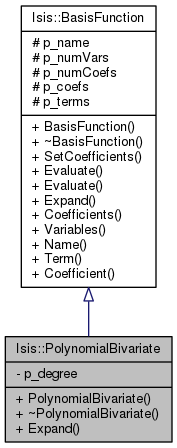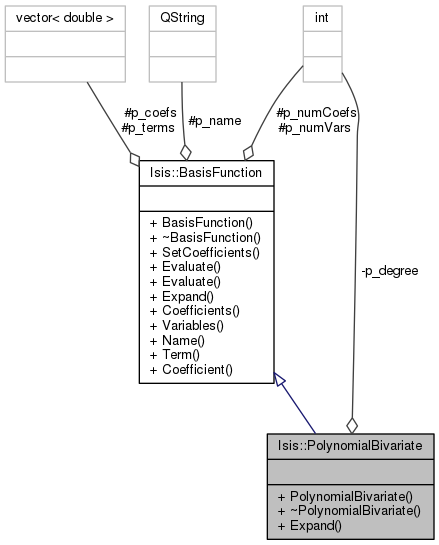 |
Isis 3 Programmer Reference
|
 |
Isis 3 Programmer Reference
|
Nth degree Polynomial with two variables. More...
#include <PolynomialBivariate.h>


Public Member Functions | |
| PolynomialBivariate (int degree) | |
| Create a PolynomialBivariate object. More... | |
| ~PolynomialBivariate () | |
| Destroys the PolynomialBivariate object. More... | |
| void | Expand (const std::vector< double > &vars) |
| This is the the overriding virtual function that provides the expansion of the two input variables into the polynomial equation. More... | |
| void | SetCoefficients (const std::vector< double > &coefs) |
| Set the coefficients for the equation. More... | |
| double | Evaluate (const std::vector< double > &vars) |
| Compute the equation using the input variables. More... | |
| double | Evaluate (const double &var) |
| Compute the equation using the input variable. More... | |
| int | Coefficients () const |
| Returns the number of coefficients for the equation. More... | |
| int | Variables () const |
| Returns the number of variables in the equation. More... | |
| QString | Name () const |
| Returns the name of the equation. More... | |
| double | Term (int c) const |
| Returns the cth term. More... | |
| double | Coefficient (int i) const |
| Returns the ith coefficient. More... | |
Protected Attributes | |
| QString | p_name |
| The name of the equation. Call it by using Name() More... | |
| int | p_numVars |
| The number of variables in the equation. Call it by using Variables() More... | |
| int | p_numCoefs |
| The number of coefficients in the equation. More... | |
| std::vector< double > | p_coefs |
| A vector of the coefficients in the equation. More... | |
| std::vector< double > | p_terms |
| A vector of the terms in the equation. More... | |
Private Attributes | |
| int | p_degree |
| The order/degree of the polynomial. More... | |
Nth degree Polynomial with two variables.
This is a derived class from BasisFunction which provides the capabilities of a polynomial equation in two variables with degree n, where n is specified during the object construction. For example, Degree = 1 z = a + b*x + c*y Degree = 2 z = a + b*x + c*y + d*x**2 + e*x*y + f*y**2 Degree = 3 z = a + b*x + c*y + d*x**2 + e*x*y + f*y**2 + g*x**3 + h*x**2*y
Definition at line 37 of file PolynomialBivariate.h.
| Isis::PolynomialBivariate::PolynomialBivariate | ( | int | degree | ) |
Create a PolynomialBivariate object.
| degree | The order/degree of the polynomial |
Definition at line 17 of file PolynomialBivariate.cpp.
References p_degree.
|
inline |
Destroys the PolynomialBivariate object.
Definition at line 42 of file PolynomialBivariate.h.
|
inlineinherited |
Returns the ith coefficient.
| i | The index for the desired coefficient. |
Definition at line 107 of file BasisFunction.h.
References Isis::BasisFunction::p_coefs.
Referenced by Isis::PolynomialUnivariate::DerivativeVar(), Isis::SpicePosition::LoadHermiteCache(), Isis::SurfaceModel::MinMax(), Isis::SpicePosition::SetPolynomial(), Isis::SpiceRotation::SetPolynomial(), and Isis::Affine::Solve().
|
inlineinherited |
Returns the number of coefficients for the equation.
Definition at line 64 of file BasisFunction.h.
References Isis::BasisFunction::p_numCoefs.
Referenced by Isis::PolynomialUnivariate::DerivativeCoef(), Isis::PolynomialUnivariate::DerivativeVar(), Isis::SpicePosition::SetPolynomial(), Isis::SpiceRotation::SetPolynomial(), Isis::LeastSquares::SolveQRD(), and Isis::LeastSquares::SolveSVD().
|
inherited |
Compute the equation using the input variable.
| var | A single double value to use for the equation. |
Definition at line 101 of file BasisFunction.cpp.
References Isis::BasisFunction::Evaluate().
|
inherited |
Compute the equation using the input variables.
| vars | A vector of double values to use for the equation. After setting the coefficients, this can be invoked many times to compute output values given input values. |
Definition at line 64 of file BasisFunction.cpp.
References Isis::BasisFunction::Expand(), Isis::BasisFunction::p_coefs, Isis::BasisFunction::p_numCoefs, Isis::BasisFunction::p_numVars, Isis::BasisFunction::p_terms, Isis::IException::Programmer, and Isis::toString().
Referenced by Isis::BasisFunction::Evaluate(), Isis::LeastSquares::Evaluate(), Isis::SpiceRotation::EvaluatePolyFunction(), Isis::SpicePosition::LoadHermiteCache(), Isis::SpicePosition::SetEphemerisTimePolyFunction(), Isis::SpiceRotation::setEphemerisTimePolyFunction(), Isis::LeastSquares::SolveQRD(), and Isis::LeastSquares::SolveSVD().
|
virtual |
This is the the overriding virtual function that provides the expansion of the two input variables into the polynomial equation.
See BasisFunction for more information.
| vars | A vector of double values to use for the expansion. |
Reimplemented from Isis::BasisFunction.
Definition at line 29 of file PolynomialBivariate.cpp.
References p_degree, and Isis::BasisFunction::p_terms.
|
inlineinherited |
Returns the name of the equation.
Definition at line 80 of file BasisFunction.h.
References Isis::BasisFunction::p_name.
Referenced by Isis::LeastSquares::AddKnown().
|
inherited |
Set the coefficients for the equation.
| coefs | A vector of coefficients for the equation. |
Definition at line 42 of file BasisFunction.cpp.
References Isis::BasisFunction::p_coefs, Isis::BasisFunction::p_numCoefs, Isis::IException::Programmer, and Isis::toString().
Referenced by Isis::SpiceRotation::DCJdt(), Isis::SpiceRotation::EvaluatePolyFunction(), Isis::SpicePosition::LoadHermiteCache(), Isis::PolynomialUnivariate::PolynomialUnivariate(), Isis::SpicePosition::SetEphemerisTimePolyFunction(), Isis::SpiceRotation::setEphemerisTimePolyFunction(), Isis::SpiceRotation::SetPolynomial(), Isis::SpicePosition::SetPolynomial(), Isis::LeastSquares::SolveQRD(), Isis::LeastSquares::SolveSparse(), and Isis::LeastSquares::SolveSVD().
|
inlineinherited |
Returns the cth term.
This is only valid after a Evalute/Expand has been invoked. It represents the expansion of the variables into the ith term. For example,
\[ x = C1 + C2*x + C3*y + C4*x*y \]
would return x*y for the 3rd term (zero-based)
| c | The index for the desired coefficient. |
Definition at line 97 of file BasisFunction.h.
References Isis::BasisFunction::p_terms.
Referenced by Isis::LeastSquares::FillSparseA(), Isis::LeastSquares::SolveQRD(), and Isis::LeastSquares::SolveSVD().
|
inlineinherited |
Returns the number of variables in the equation.
Definition at line 72 of file BasisFunction.h.
References Isis::BasisFunction::p_numVars.
Referenced by Isis::LeastSquares::AddKnown(), and Isis::NthOrderPolynomial::Expand().
|
protectedinherited |
A vector of the coefficients in the equation.
Call it by using Coefficient()
Definition at line 123 of file BasisFunction.h.
Referenced by Isis::BasisFunction::Coefficient(), Isis::BasisFunction::Evaluate(), and Isis::BasisFunction::SetCoefficients().
|
private |
The order/degree of the polynomial.
Definition at line 47 of file PolynomialBivariate.h.
Referenced by Expand(), and PolynomialBivariate().
|
protectedinherited |
The name of the equation. Call it by using Name()
Definition at line 113 of file BasisFunction.h.
Referenced by Isis::BasisFunction::BasisFunction(), and Isis::BasisFunction::Name().
|
protectedinherited |
The number of coefficients in the equation.
Call it by using Coefficients()
Definition at line 119 of file BasisFunction.h.
Referenced by Isis::BasisFunction::BasisFunction(), Isis::BasisFunction::Coefficients(), Isis::BasisFunction::Evaluate(), and Isis::BasisFunction::SetCoefficients().
|
protectedinherited |
The number of variables in the equation. Call it by using Variables()
Definition at line 115 of file BasisFunction.h.
Referenced by Isis::BasisFunction::BasisFunction(), Isis::BasisFunction::Evaluate(), and Isis::BasisFunction::Variables().
|
protectedinherited |
A vector of the terms in the equation.
Call it by using Term()
Definition at line 127 of file BasisFunction.h.
Referenced by Isis::BasisFunction::Evaluate(), Isis::BasisFunction::Expand(), Isis::NthOrderPolynomial::Expand(), Expand(), Isis::PolynomialUnivariate::Expand(), and Isis::BasisFunction::Term().